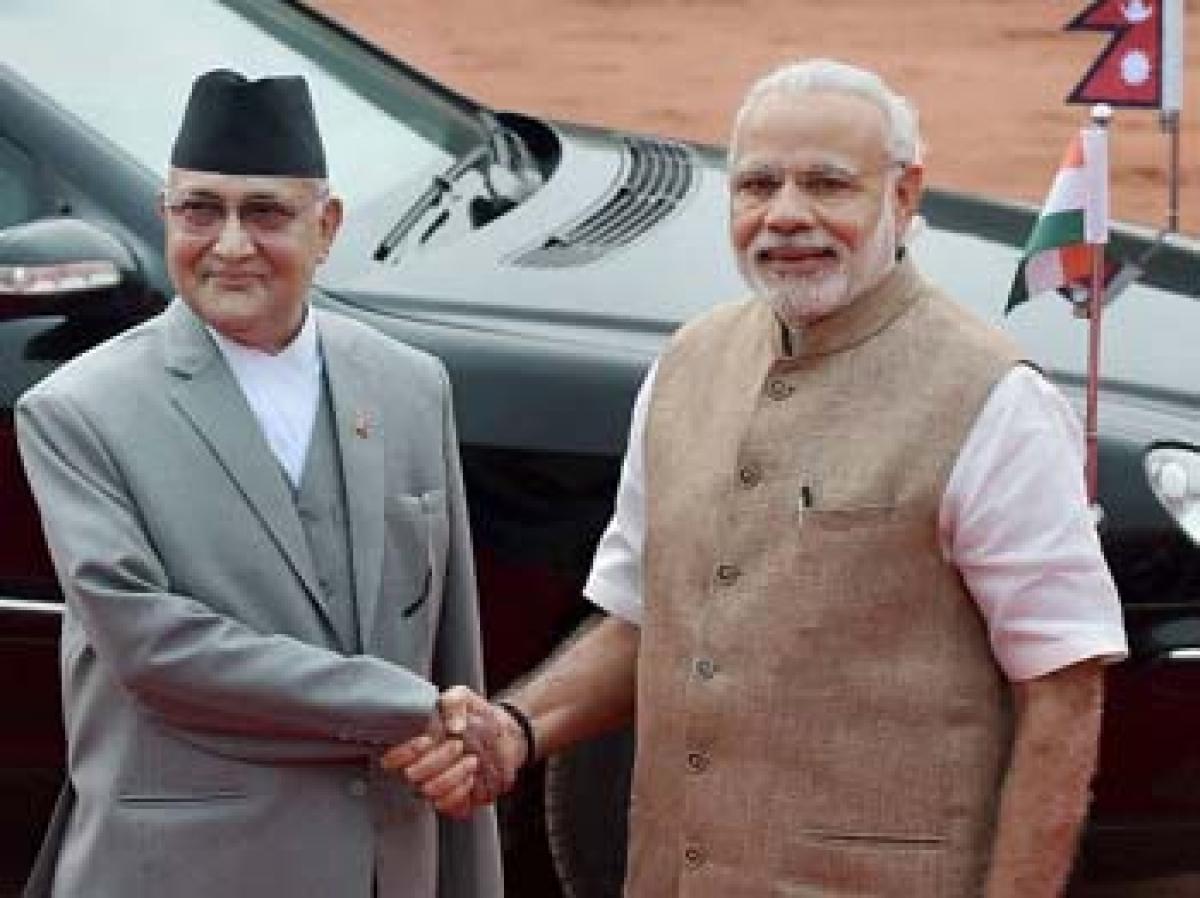Live
- Kerala Hindu leader gifts Rig Veda to Pope Francis
- OakTree School Celebrates Eight Years of Success, Announces Future Expansion
- Why plant-based milks may not be healthy
- Jharkhand: Ayushman Bharat cards in demand, Sahebganj residents rush to the centre
- Supreme Court likely to pass directions on implementation of policy to curb air pollution in Delhi-NCR tomorrow
- The first day of Group-2 Paper 1, 2 exams in Wanaparthy district ended peacefully, said Additional Collector Revenue G. Venkateswarlu
- VP Dhankhar urges corporates to invest in education
- Punjab DGP, MHA official request farmer leader Dallewal to end 20-day fast
- Stage Collapse During Swearing-In Ceremony of KUDA chairman in Kakinada
- Govt unveils ‘Jalvahak’ to boost inland waterways
Just In

The recall of Nepal’s Ambassador in Delhi Deep Kumar Upadhyaya’s due to differences between the Prime Minister KP Sharma Oli and him over cancellation of its President\'s visit to India has resulted in yet another tumultuous scenario in Kathmandu.
New Delhi needs to introspect about why Modi’s ‘neighbourhood first’ policy has backfired in Nepal, after having gotten off to a splendid start when he visited Nepal in 2014 and laid out the contours of the relationship which he wanted to develop
The recall of Nepal’s Ambassador in Delhi Deep Kumar Upadhyaya’s due to differences between the Prime Minister KP Sharma Oli and him over cancellation of its President's visit to India has resulted in yet another tumultuous scenario in Kathmandu.
Remember, President Bidya Bhandari was to arrive in India for a five-day maiden visit on 9 May with a trip to the Ujjain Kumbh Mela but it was cancelled at the 11th hour; barely 72 hours before her departure for Delhi.
Though no reason was assigned for cancellation of the trip, it was believed to indicate Nepal’s unhappiness with India over the latter’s alleged meddling in the Himalayan nation’s internal affairs. Further, Upadhyay was blamed for being a part of the conspiracy hatched by Deuba with the Indian authorities to topple the government, prop up the Madhes-based parties and being close to Indian Ambassador Ranjit Rai.
Nepal appears, once again, to be on the brink of a leadership change. The past few days have seen frenetic activity, driven by Maoist leader Prachanda’s desire to oust the Prime Minister just months after he took charge.
While the attempt has been stalled for the moment, it might be only a matter of time before the number-crunchers get to work to forge an alternative coalition in the 601-member Parliament. There is a difference of only 24 seats between Oli’s Communist Party of Nepal (UML) and the Nepali Congress. With their 83 seats, the Maoists can always tip the balance.
Undeniably, keeping the confidence of a fragmented Parliament and fractured internal politics were always going to be a challenge for Oli. But that he finds himself embattled so early in his tenure is also the result of failing to deliver on three important promises.
One, failure to form an equitable Constitution and polity which accommodates the sensitivities of Madhesis, Janjatis and other marginalised groups. Two, in a political uncertain atmosphere and a dysfunctional government, Nepal’s reconstruction efforts have suffered. The administration has failed its people entirely on speeding up reconstruction after last year’s earthquake which killed nearly 9,000 people.
Three, Oli has not done enough to reverse the estrangement with India. Even though he has reached out to different groups and invited the Samyukta Loktantrik Madhesi Morcha (SLMM) back for talks after a three-month hiatus, it doesn’t seem enough. Indeed, India is invariably accused of being an interfering big brother and blamed for any crisis in its neighbouring countries. This occasion too is no exception.
The last six months have not been favourable for India-Nepal relations due to the following reasons. New Delhi has criticised Nepal’s Constitution, banded with other countries at the UN Human Rights Council and the European Union to rebuke Kathmandu. Besides, Nepal’s streets are abuzz with rumours about a possible Indian involvement in the late Sushil Koirala’s surprise election challenge to Oli last year and of India having a hand in Prachanda’s gambit this month. However, many of these tales have no basis in fact.
Undoubtedly, Oli’s tenure has witnessed a steep downturn in relations with India. Like his coalition partner Prachanda, he has also sought to bolster legitimacy by deliberately stoking nationalist sentiment and blaming India for his problems, both political and economic and flaunting the China card.
Pertinently, after visiting India, Oli undertook a much publicised visit to China in March. Among the slew of agreements signed, the most publicised was that on transit which permits use of Chinese ports for transit of goods to Nepal. Yet one look at a map makes it clear that this cannot change the dictates of geography.
New Delhi needs to introspect about why Modi’s “neighbourhood first” policy has backfired in Nepal, after having gotten off to a splendid start when he visited Nepal in 2014 and laid out the contours of the relationship which he wanted to develop. The need of the hour is to find a Nepal policy which can resurrect the image of India that he had successfully presented.
Blaming it on neighbour
- Nepal PM embattling fractured internal politics, finds himself embroiled so early in his term
- His visible failure to address concerns of Madhesis, Janjatis and other marginalised groups
- He is unhappy with India over the latter’s alleged meddling in its internal affairs
- The PM even cancelled President Bidya Bhandari’s visit to India
- Blaming India for his problems, political and economic, he is now flaunting the China card
By Amrita Banerjee

© 2024 Hyderabad Media House Limited/The Hans India. All rights reserved. Powered by hocalwire.com







